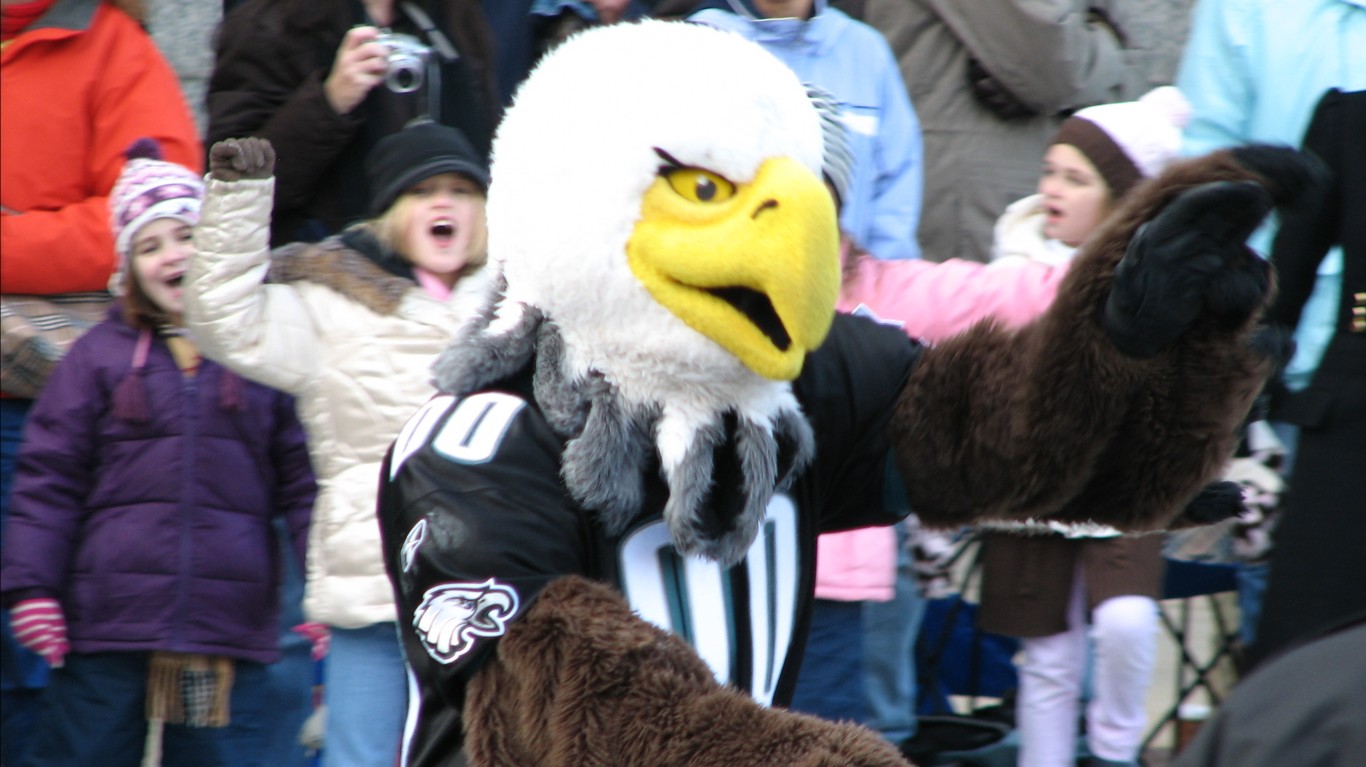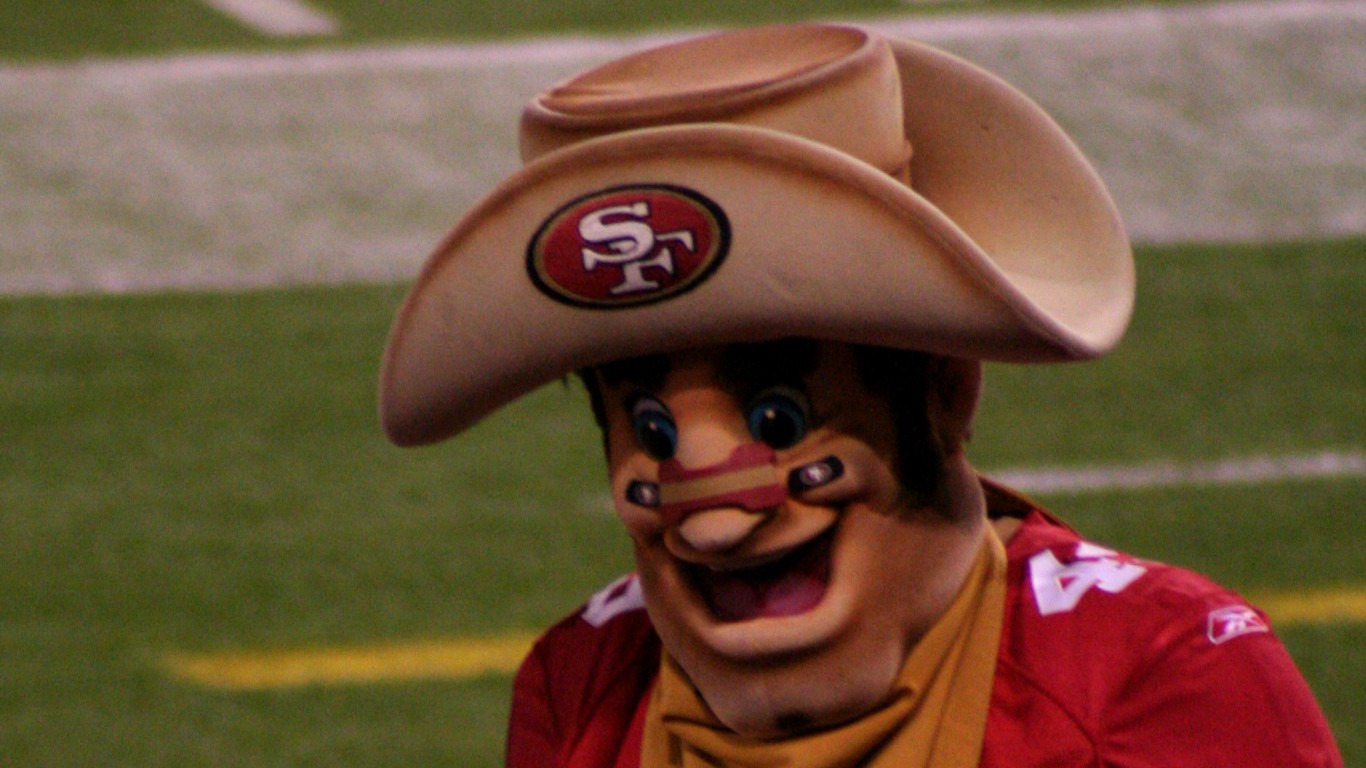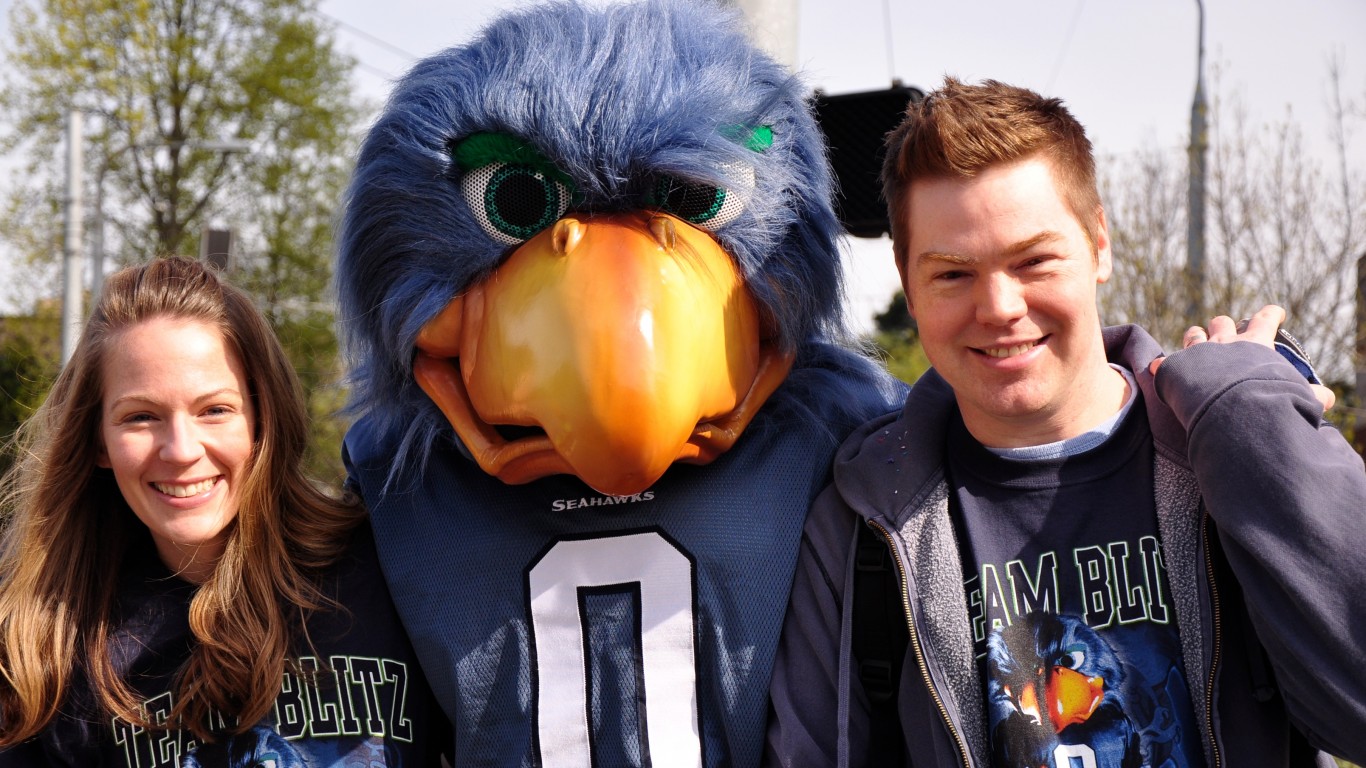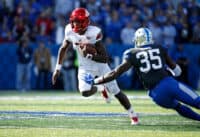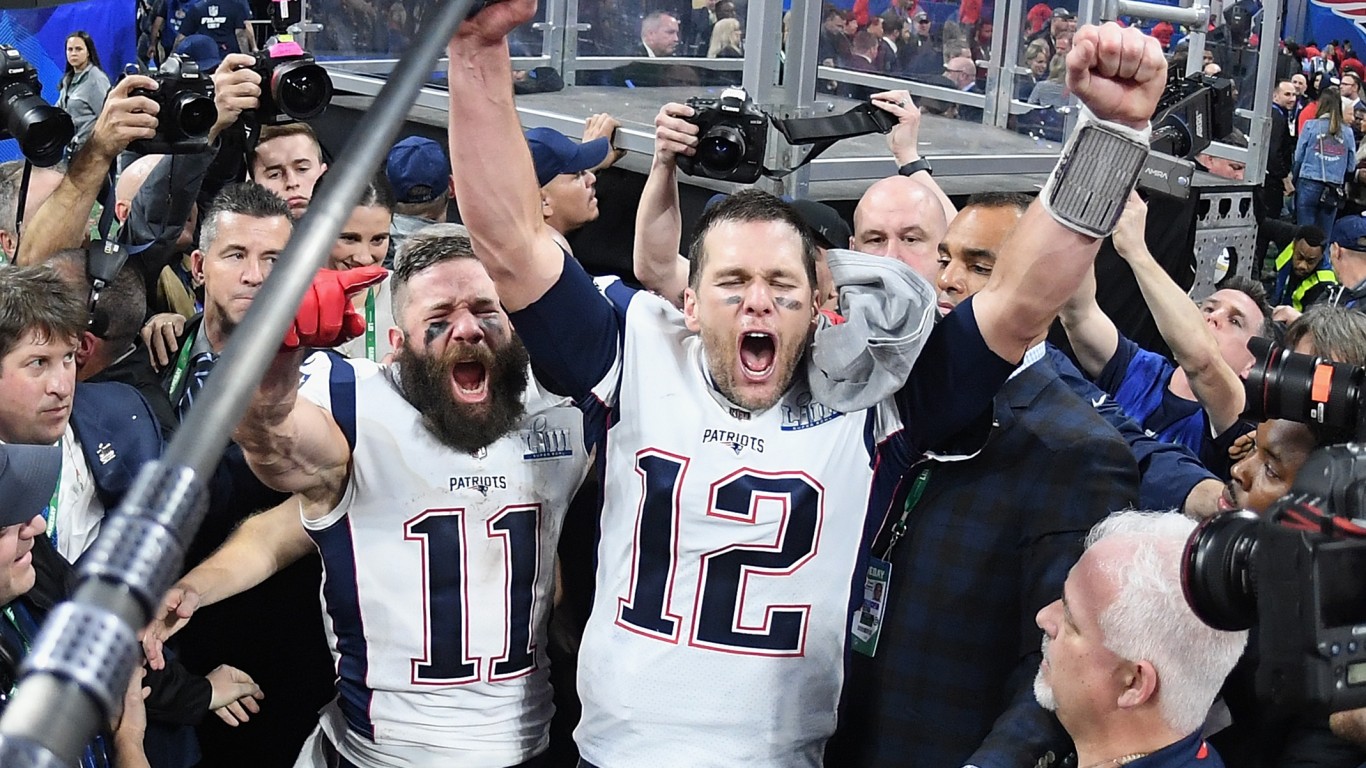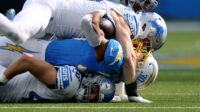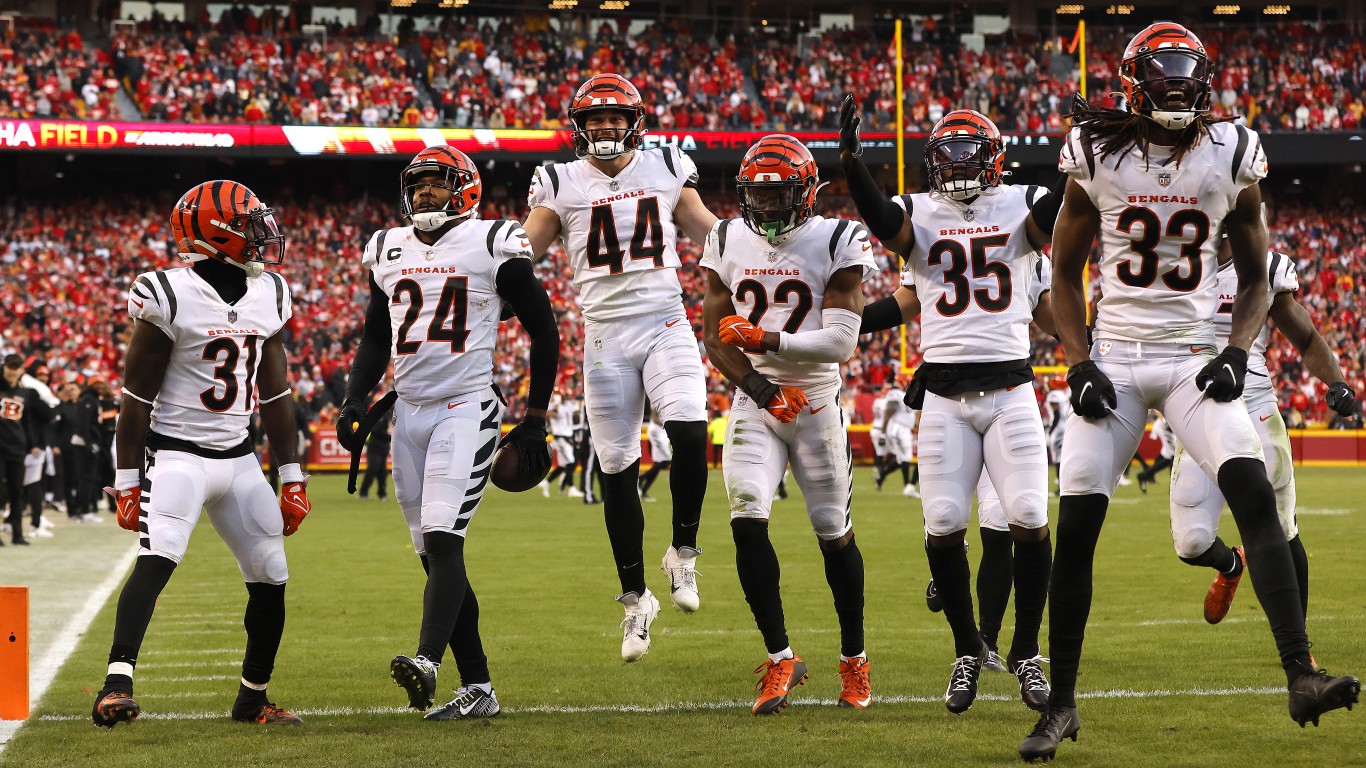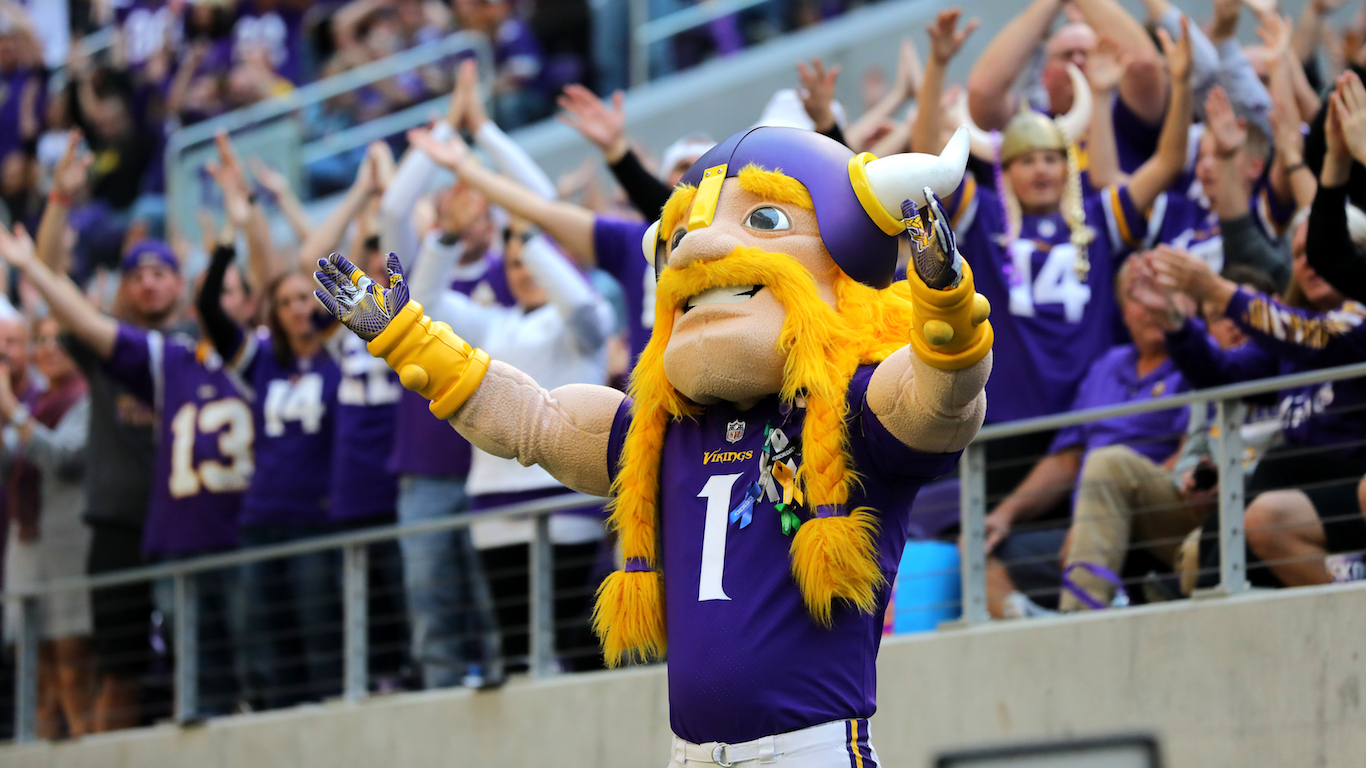
The National Football League of 2019 might be nearly unrecognizable to those who founded it a 100 years ago. Today’s NFL is a slick and sophisticated money-making machine that has become the pre-eminent sports league in the United States, a stark contrast to the unsparing, smash-mouth sport of a century ago. As part of the league’s relentless marketing efforts and community outreach, NFL teams use mascots to connect with their fan bases.
To find out the story behind each NFL mascot, 24/7 Tempo reviewed media sources such as ESPN, as well as the Pro Football Hall of Fame and the websites of NFL teams. All but four NFL teams — Green Bay Packers, New York Jets, New York Giants, and Washington Redskins — have mascots representing their teams.
Unlike college mascots, which have a longer and deeper connection with the universities they represent, most NFL mascots came on the scene within the last 25 years. Some mascots were adopted by teams after NFL Properties, the merchandising and licensing arm of the National Football League, developed characters as part of the Team NFL Heroes league-wide mascot program in the mid-1990s.
Mascots are used by teams to cultivate community relations and connect with younger fans, all efforts to avoid depleting their fan bases. These are the sports teams running out of fans.
Mascots are also a revenue source and can be booked for birthday parties and other events on a team’s website. Many mascots have developed their personas through their own Facebook pages and Twitter handles.
NFL mascots can be lovable or annoying, exuberant or aloof, shaggy-maned or jut-jawed. Some teams such as the Saints have more than one. Not all mascot launches have been successful. The Vikings had several misfires before settling on a comically hulking caricature named Viktor who has resonated with fans.
Some mascots have run afoul of the league and owners of other teams because of over-exuberant behavior on the field. Jaxson de Ville, the mascot of the Jacksonville Jaguars, drew the ire of Indianapolis Colts President Bill Polian in 2007 over his on-field antics. The Carolina Panthers mascot overstepped a boundary in 1996 when during a game between the Panthers and Pittsburgh Steelers he fell on a live ball following a punt. Mascot misconduct can stoke team rivalries. Here are the biggest rivalries in sports.
Click here to see the story behind every NFL mascot.
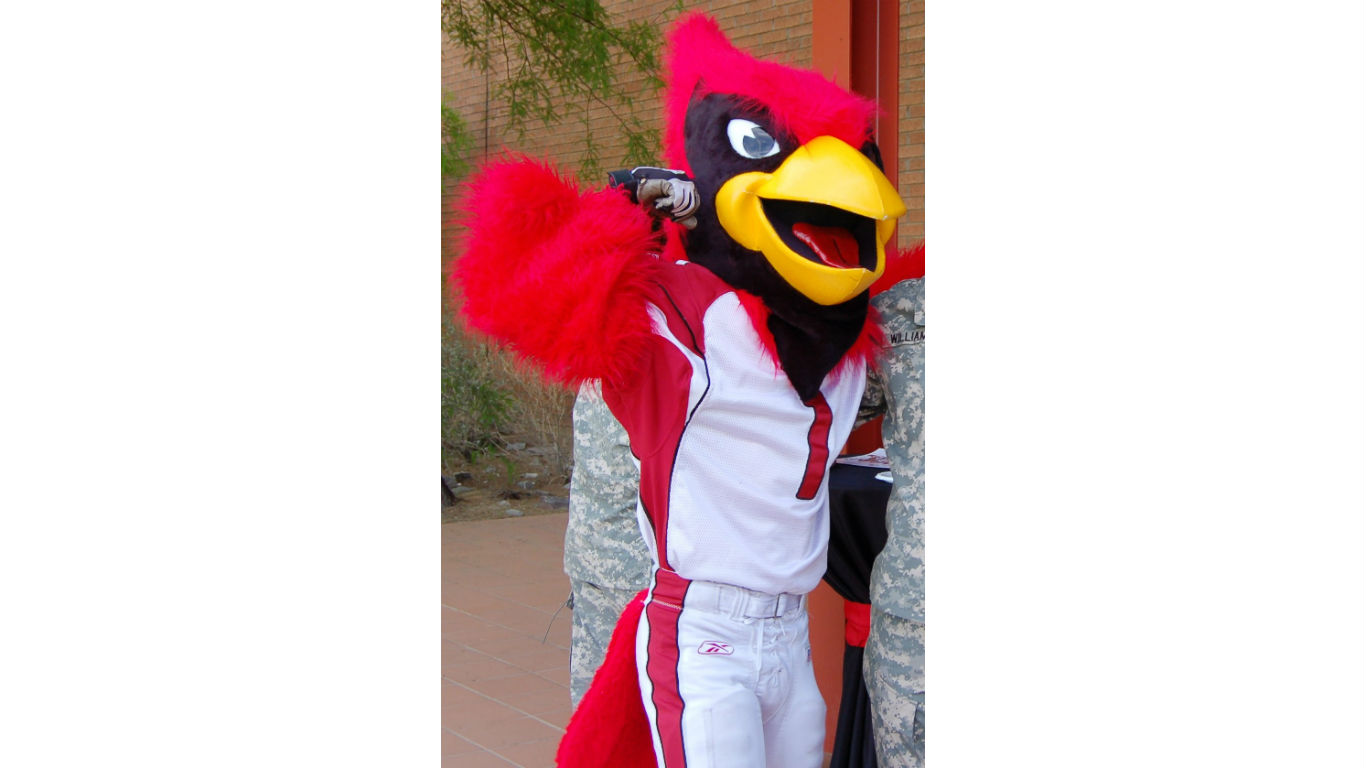
1. Arizona Cardinals
>Mascot: Big Red
>When mascot debuted: 1998
At 100 years old, the Arizona Cardinals are one of the National Football League’s oldest franchises, though they’ve only had an official mascot since 1998. Big Red is a red cardinal-like bird figure. The original color of the team was a faded maroon, which was eventually called cardinal red.
[in-text-ad]
2. Atlanta Falcons
>Mascot: Freddie Falcon
>When mascot was debuted: About 1984
Freddie Falcon became the Atlanta Falcons mascot in the mid-1980s. The team took the Falcons name following a contest to name the team after Atlanta was awarded an NFL franchise in 1965. Falcon was suggested by a school teacher who liked the name because “⦠the falcon is proud and dignified with great courage and fight.”
3. Baltimore Ravens
>Mascot: Poe
>When mascot was debuted: 1996
Poe is a raven and became the Baltimore Ravens mascot after Ravens was chosen by fans in a poll conducted by the Baltimore Sun. The name is in honor of Edgar Allan Poe, master of the macabre, who wrote his famous poem, “The Raven,” while living in Baltimore.
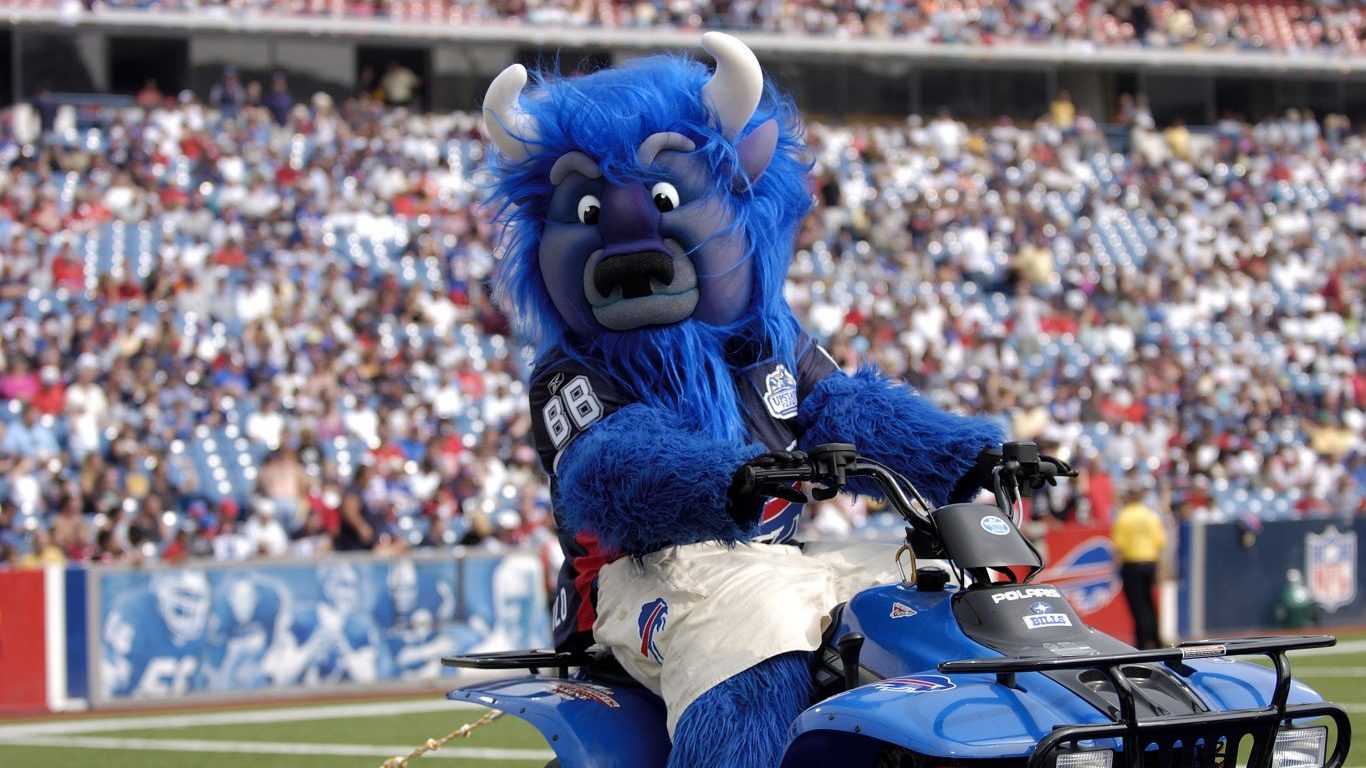
4. Buffalo Bills
>Mascot: Billy Buffalo
>When mascot was debuted: 2000
Billy Buffalo debuted in 2000 at a Buffalo Bills home game in Orchard Park, New York. He is an 8-foot-tall blue American buffalo and wears uniform “number” BB. The Bills name is a reference to frontiersman and Wild West entertainer Buffalo Bill Cody.
[in-text-ad-2]
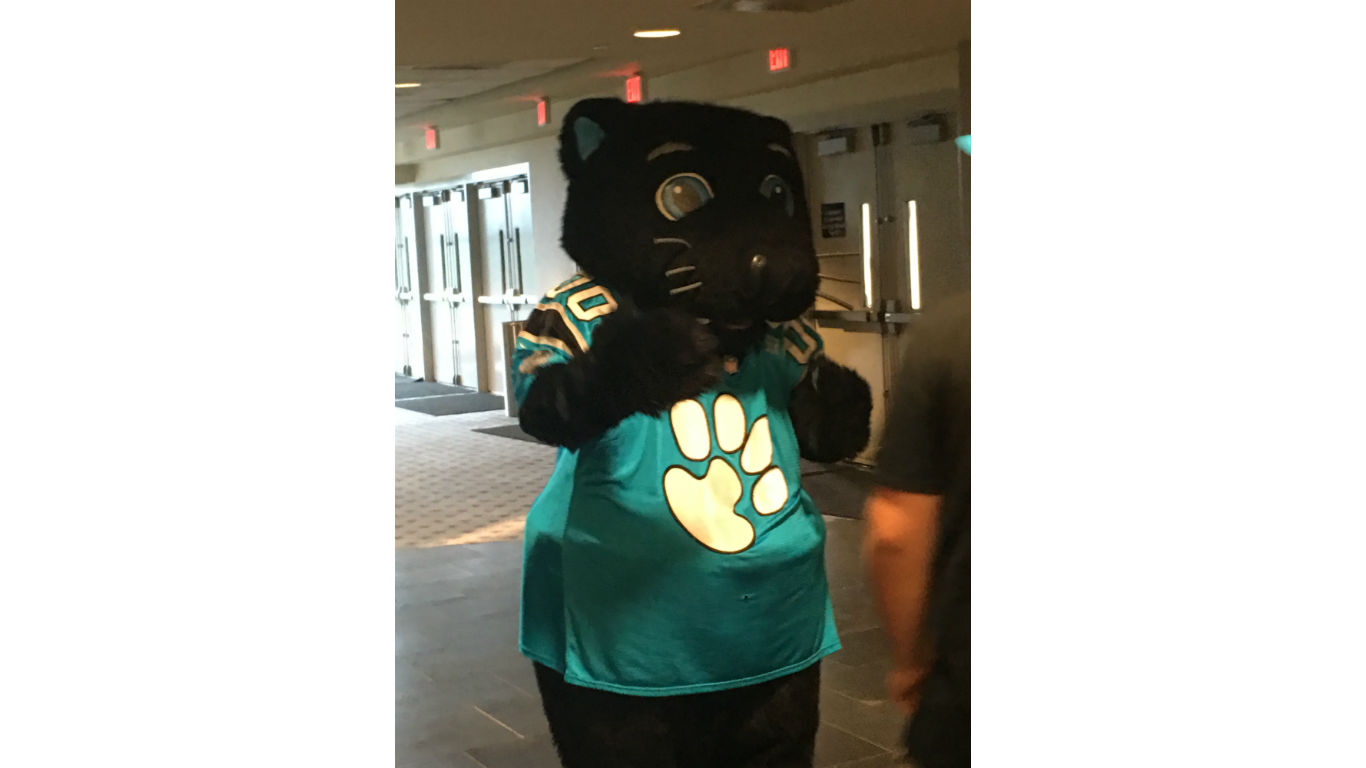
5. Carolina Panthers
>Mascot: Sir Purr
>When mascot was debuted: 1995
After Charlotte, North Carolina, was awarded an NFL franchise in 1995, Mark Richardson, the son of team owner Jerry Richardson, chose the team’s name and team colors of black, blue, and silver. The Panther mascot came into being the same year. The Panther mascot, wearing jersey number 00, stirred a bit of controversy in 1996 when during a game between the Carolina Panthers and Pittsburgh Steelers he fell on a live ball following a punt.

6. Chicago Bears
>Mascot: Staley Da Bear
>When mascot was debuted: 2003
The Chicago Bears, one of the charter members of the NFL, adopted Staley Da Bear as their mascot in 2003. The mascot takes its name from the team’s original sponsor, the Staley Starch Company. The Bears owe their name to owner George Halas, who figured that football players were bigger than baseball players, and since Chicago was home to baseball’s Cubs, Bears would be the logical name for the town’s professional football team.
[in-text-ad]
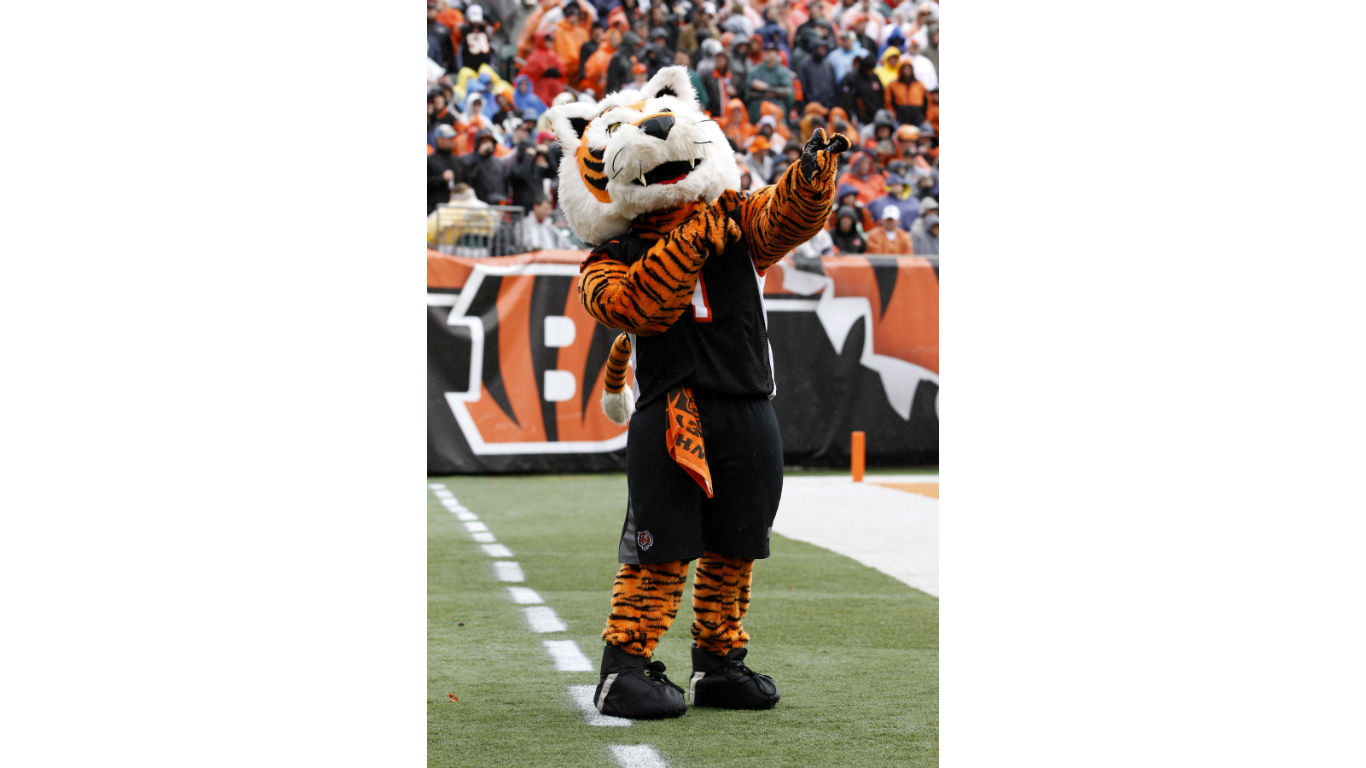
7. Cincinnati Bengals
>Mascot: Who Dey
>When mascot was debuted: Unknown
Who Dey, the Cincinnati Bengals mascot, is a playful character clad in black and orange stripes who good-naturedly harasses the team’s rival mascot. Who Dey does not speak and communicates via pantomime. “Who Dey?!” is also the name of a chant shouted by fans of the Bengals.

8. Cleveland Browns
>Mascot: Brownie the Elf
>When mascot was debuted: 2013
Brownie the Elf first appeared as a mascot for the Cleveland Browns in 2013, but his lineage goes farther back. He was the emblem of the Browns dating back to 1946, when the Browns were in the All-America Football Conference, before they joined the NFL. The Browns also have another mascot, Chomps, a reference to their fans who occupy the “dog pound” at home games. Chomps is a 6-foot-1-inch Labrador retriever who wears jersey number 00.

9. Dallas Cowboys
>Mascot: Rowdy
>When mascot was debuted: 1996
Rowdy, the official mascot of the Dallas Cowboys, was developed by NFL Properties in the early 1990s as a character called Big D as part of the league’s mascot program. The Cowboys made him their official mascot in 1996 and changed his name to Rowdy.
[in-text-ad-2]

10. Denver Broncos
>Mascot: Thunder
>When mascot was debuted: 1993
Thunder II is the second generation of Arabian horses to serve as mascot for the Denver Broncos. The original Thunder debuted on Sept. 12, 1993, in a game against the San Diego Chargers. After each Denver touchdown, Thunder would gallop across the field. Denver also has another mascot, called Miles, an orange-maned and orange-tailed character who prowls the sidelines.
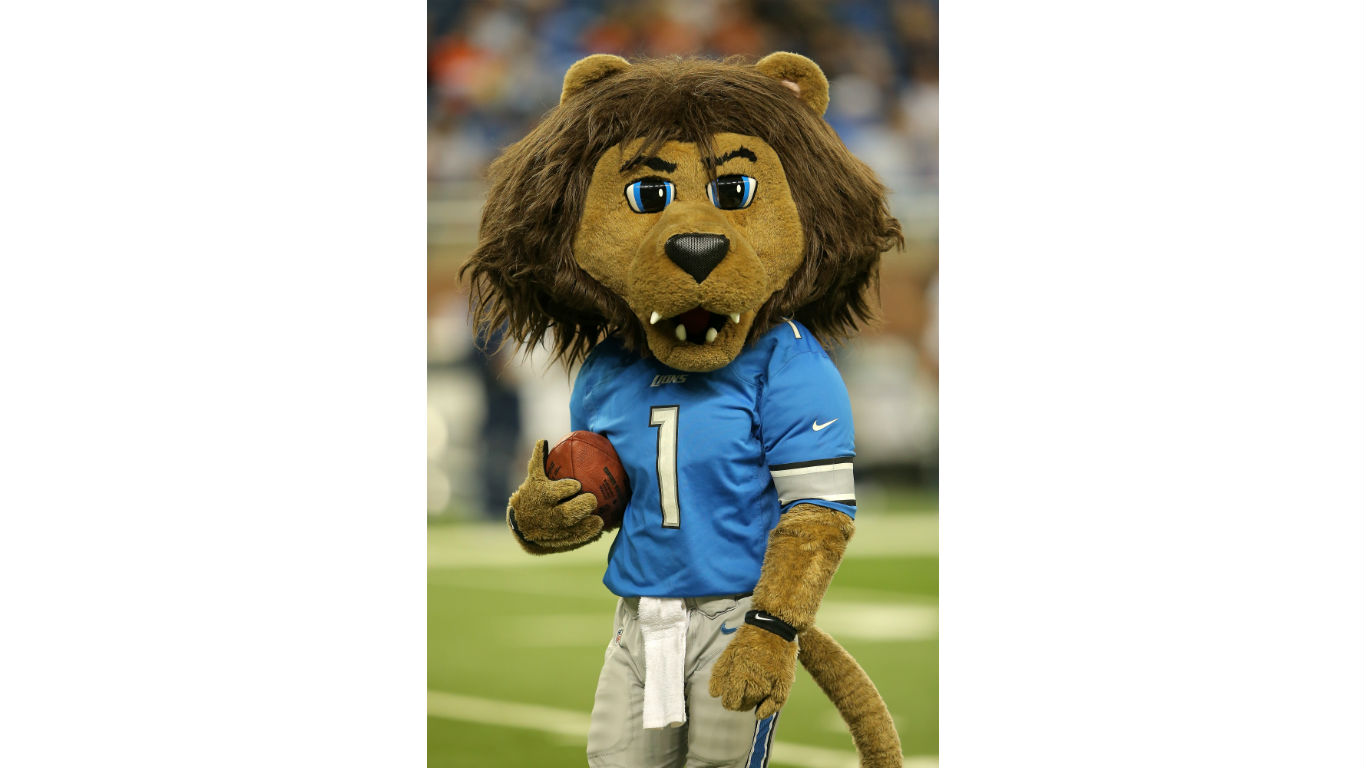
11. Detroit Lions
>Mascot: Roary
>When mascot was debuted: 1995
Roary is a lion-costumed mascot described on the Detroit Lions website as a fun-loving lion who provides food for needy families and teaches kids the importance of character education and being active.
[in-text-ad]
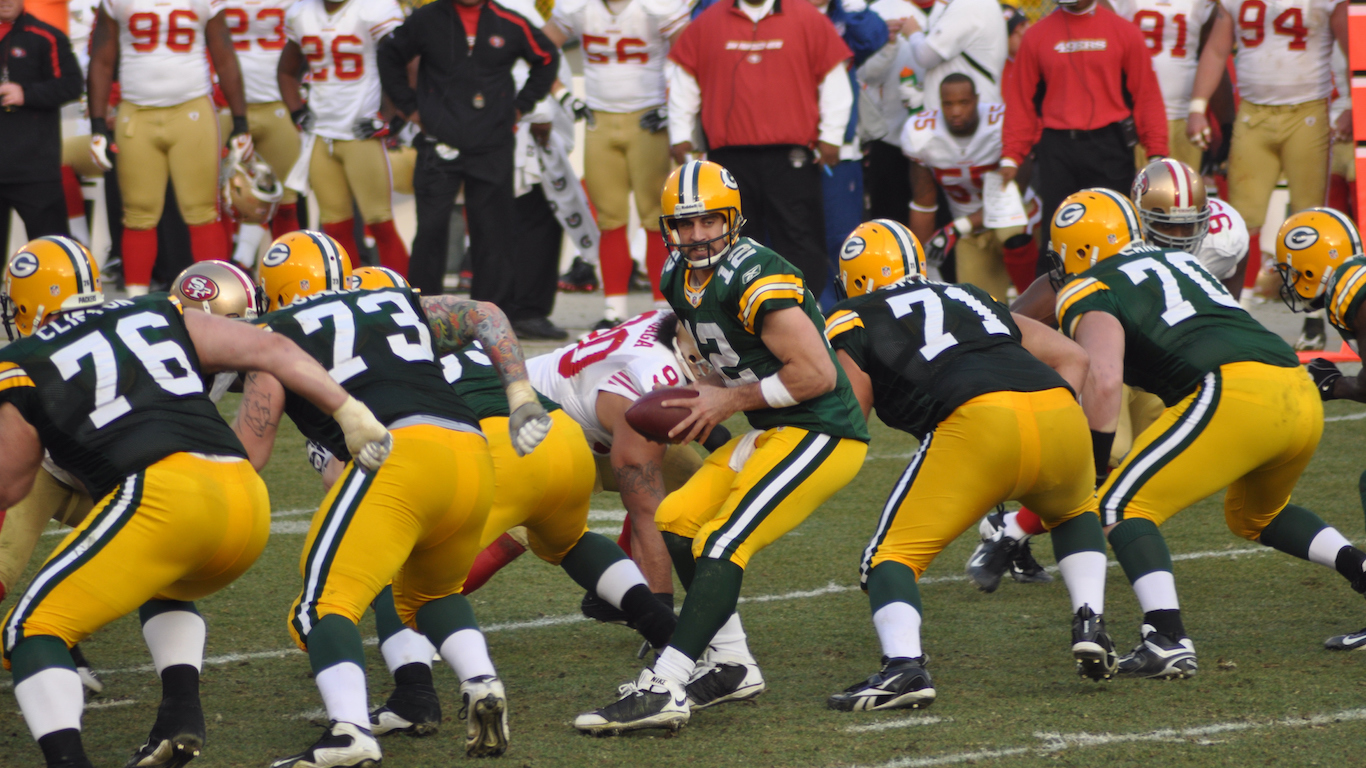
12. Green Bay Packers
>Mascot: N/A
>When mascot was debuted: N/A
The Green Bay Packers, one of the oldest NFL franchises, do not have a mascot. They were named after two packing companies that eventually went out of business but the name remained.
13. Houston Texans
>Mascot: Toro
>When mascot was debuted: 2001
According to the Houston Texans website, Toro was born on April 21, 2001, corresponding with the zodiac sign Taurus, or bull. Toro is clad in the Texans’ colors of red, white, and blue. Like many mascots, Toro has his own Facebook page and Twitter handle.

14. Indianapolis Colts
>Mascot: Blue
>When mascot was debuted: 2006
Blue, the blue colt who wears jersey number 00, was first introduced on Sept.17, 2006, at the Colts’ first home regular season game against the Houston Texans, which the Colts won, 43-24. The Colts were originally based in Baltimore and their name referenced the horse-breeding tradition in that area.
[in-text-ad-2]

15. Jacksonville Jaguars
>Mascot: Jaxson de Ville
>When mascot was debuted: 1996
Jaxson de Ville has been the mascot of the Jacksonville Jaguars since their inception. The mascot wears sunglasses, a Jaguars jersey, long shorts, and black and teal sneakers and has been known to use a zip wire and bungee jump. His exuberance has gotten him into hot water and drew the ire of Indianapolis Colts President Bill Polian. He also caused controversy in 2014 during the Ebola crisis when he carried a sign that said “Towels Carry Ebola,” along with a Terrible Towel, an emblem of the Jags’ opponent, the Pittsburgh Steelers.

16. Kansas City Chiefs
>Mascot: K.C. Wolf
>When mascot was debuted: 1989
K.C. Wolf was first introduced in 1989 and was named after the team’s “Wolfpack,” the fans who sit in the bleachers. K.C. Wolf is portrayed by motivational speaker Dan Meers, who makes about 150 speaking engagements each year, talking to young people about being a buddy and not a bully, the importance of character, and eating healthful foods.
[in-text-ad]

17. Los Angeles Chargers
>Mascot: Boltman
>When mascot was debuted: 1995
Boltman was the unofficial mascot of the Los Angeles Chargers (formerly the San Diego Chargers), until Ramona, California, resident Dan Jauregui, who created the character, announced his retirement last year. Jauregui put his costume and the full intellectual property rights to the Boltman persona on eBay in July 2018 but got no takers.

18. Los Angeles Rams
>Mascot: Rampage
>When mascot was debuted: 2010
After several misfires trying to launch a mascot while they were still in St. Louis, including a fuzzy critter that looked like a rat, the Rams settled on a ram character who was named Rampage by fans. Rampage was introduced to the public by throwing out the first pitch at a St. Louis Cardinals game in July of 2010.

19. Miami Dolphins
>Mascot: T.D.
>When mascot was debuted: 1997
T.D., shorthand for The Dolphin, is also the name of the Miami Dolphins mascot. The 7-foot dolphin has been representing the Dolphins since 1997 when then-coach Jimmy Johnson “signed” the mascot as a free agent. An original dolphin mascot called Flipper, named after the beloved star of the 1960s television series of the same name, was trained to jump out of the water after each Miami touchdown.
[in-text-ad-2]
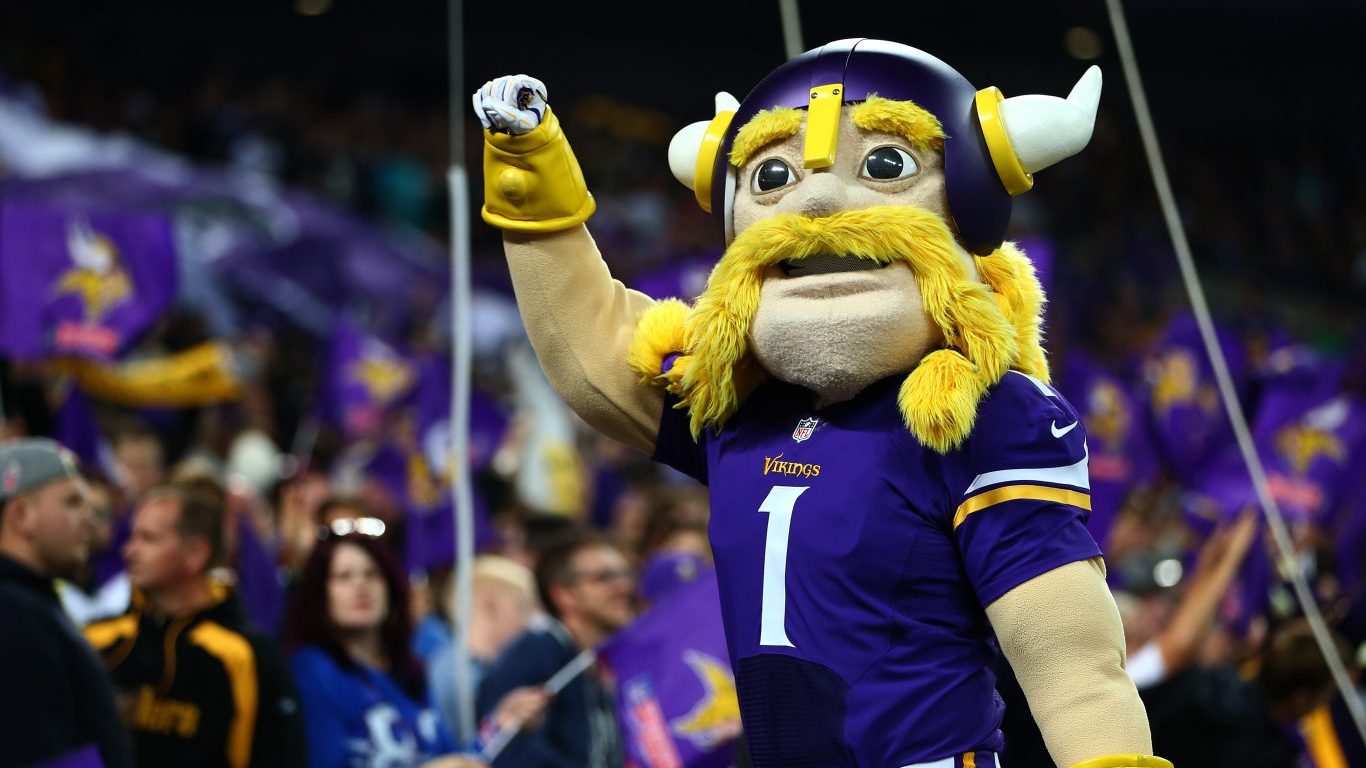
20. Minnesota Vikings
>Mascot: Viktor
>When mascot was debuted: 2007
The Minnesota Vikings are another team that made several prior attempts at launching a mascot and eventually settled on Viktor, a muscle-bound, blond-haired, horned-helmet wearing character, in 2007. The mascot was developed to appeal to the team’s younger fan base.
21. New England Patriots
>Mascot: Pat Patriot
>When mascot was debuted: 1995
The New England Patriots, who joined the American Football League in 1960, adopted the Pat Patriot mascot, invoking the patriots who fought in the American Revolution. Those who don the mascot gear should perhaps ask for combat pay; at the last Pro Bowl, New York Jets safety Jamal Adams tackled an unsuspecting Pat Patriot for laughs and nearly injured him.
[in-text-ad]
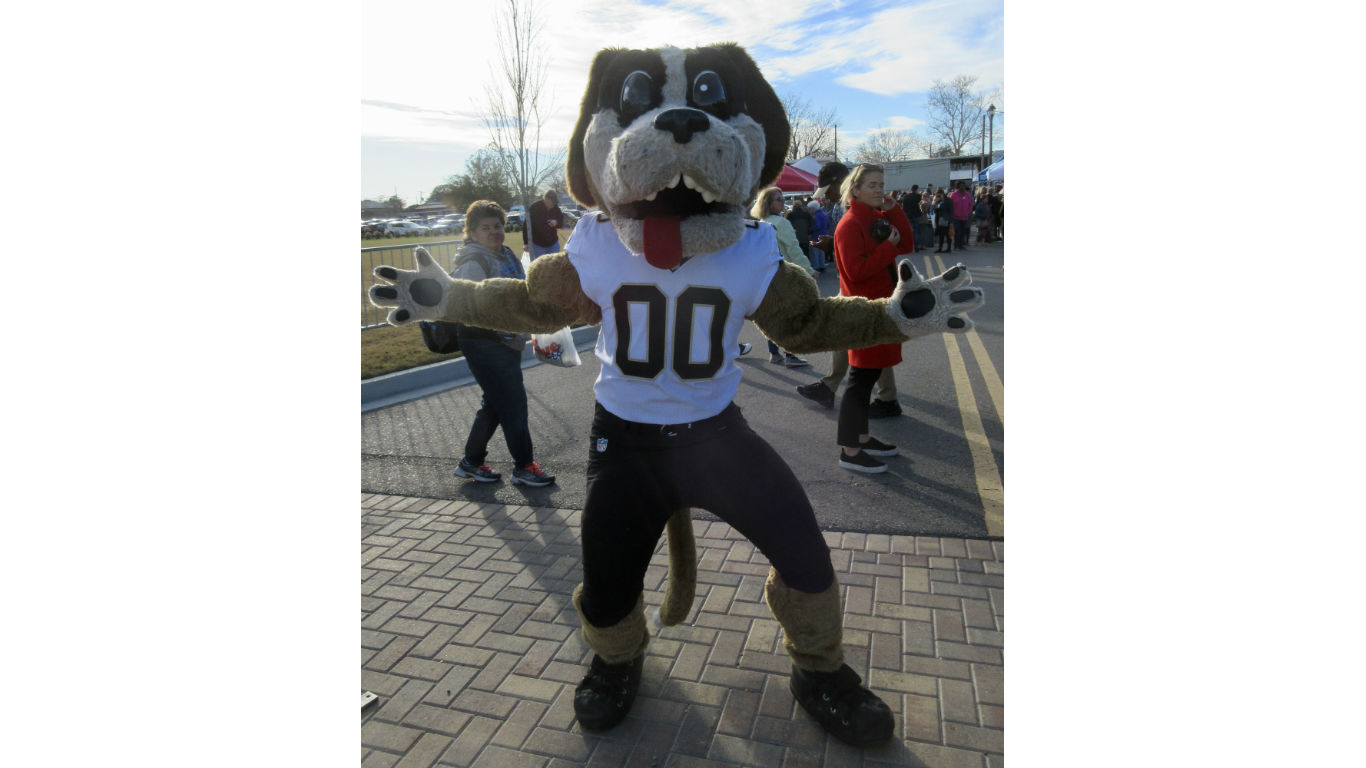
22. New Orleans Saints
>Mascot: Gumbo, Sir Saint
>When mascot was debuted: Gumbo (1998) Sir Saint (2009)
Gumbo, the mascot for the New Orleans Saints, is a St. Bernard puppy. The mascot is based on a real puppy given to the Saints by the Louisiana Restaurant Association in 1967, just before the Saints played their first NFL game. Another original mascot is Sir Saint, a helmet-wearing character with a protruding jaw, who returned to the Saints games in 2009 after a hiatus of several decades.

23. New York Giants
>Mascot: N/A
>When mascot was debuted: N/A
The New York Giants have been in the NFL since 1925, but have never had a mascot. The Giants got their name from the New York baseball team of the same name, which many football teams did at that time.

24. New York Jets
>Mascot: N/A
>When mascot was debuted:
Like their New York football brethren the Giants, the Jets also do not have a mascot. They joined the American Football League as the Titans and switched to the Jets to sound more modern.
[in-text-ad-2]
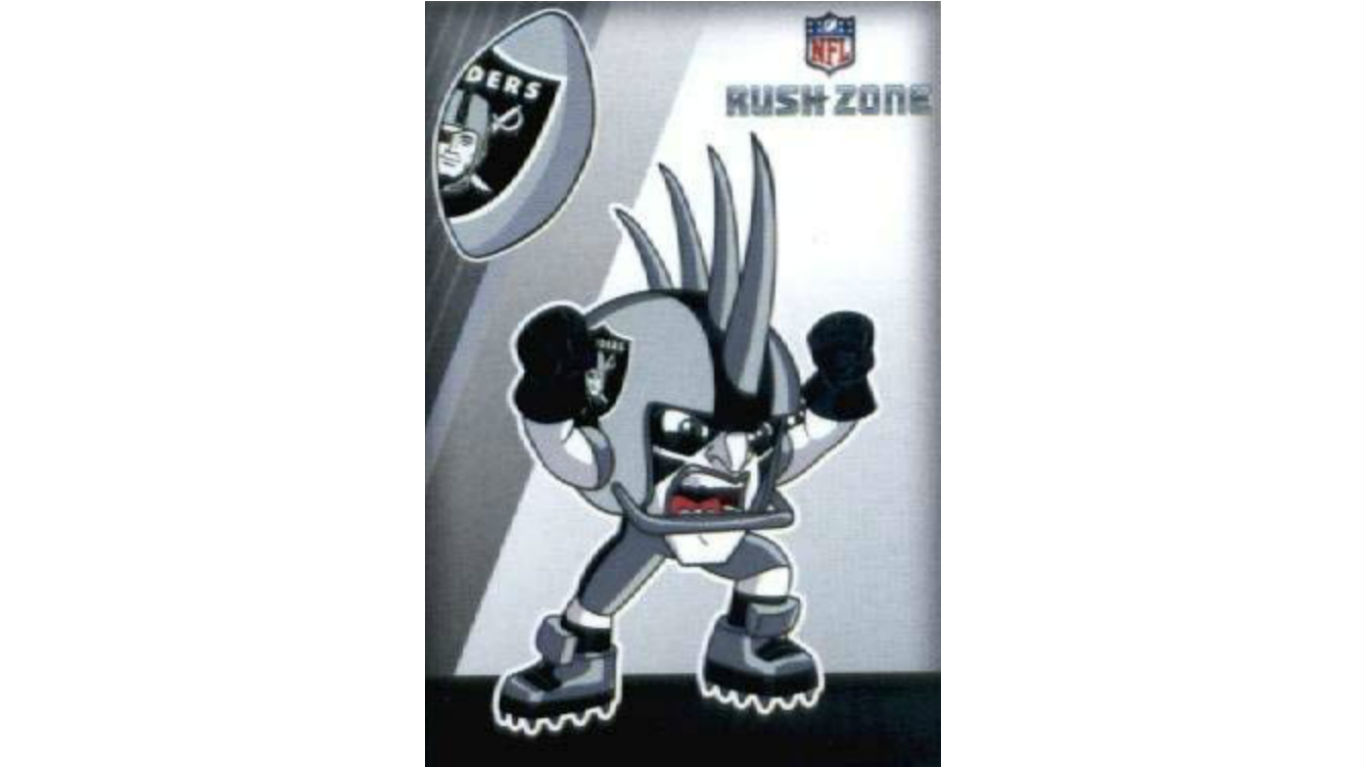
25. Oakland Raiders
>Mascot: Raider Rusher
>When mascot was debuted: 2013
The Oakland Raiders joined the American Football League in 1960, but did not adopt a mascot until 2013. Raider Rusher is derived from an animated cartoon series entitled “NFL Rush Zone” that was co-produced by the NFL and Nickelodeon. The Raiders, who embraced an outlaw persona in the past, are using the Raider character to be more youth-friendly.
26. Philadelphia Eagles
>Mascot: Swoop
>When mascot was debuted: 1996
Swoop is the mascot for the Philadelphia Eagles, a white-headed bird who wears an Eagles jersey. Swoop debuted as the mascot for the Eagles in 1996, 63 years after the Eagles joined the NFL.
[in-text-ad]
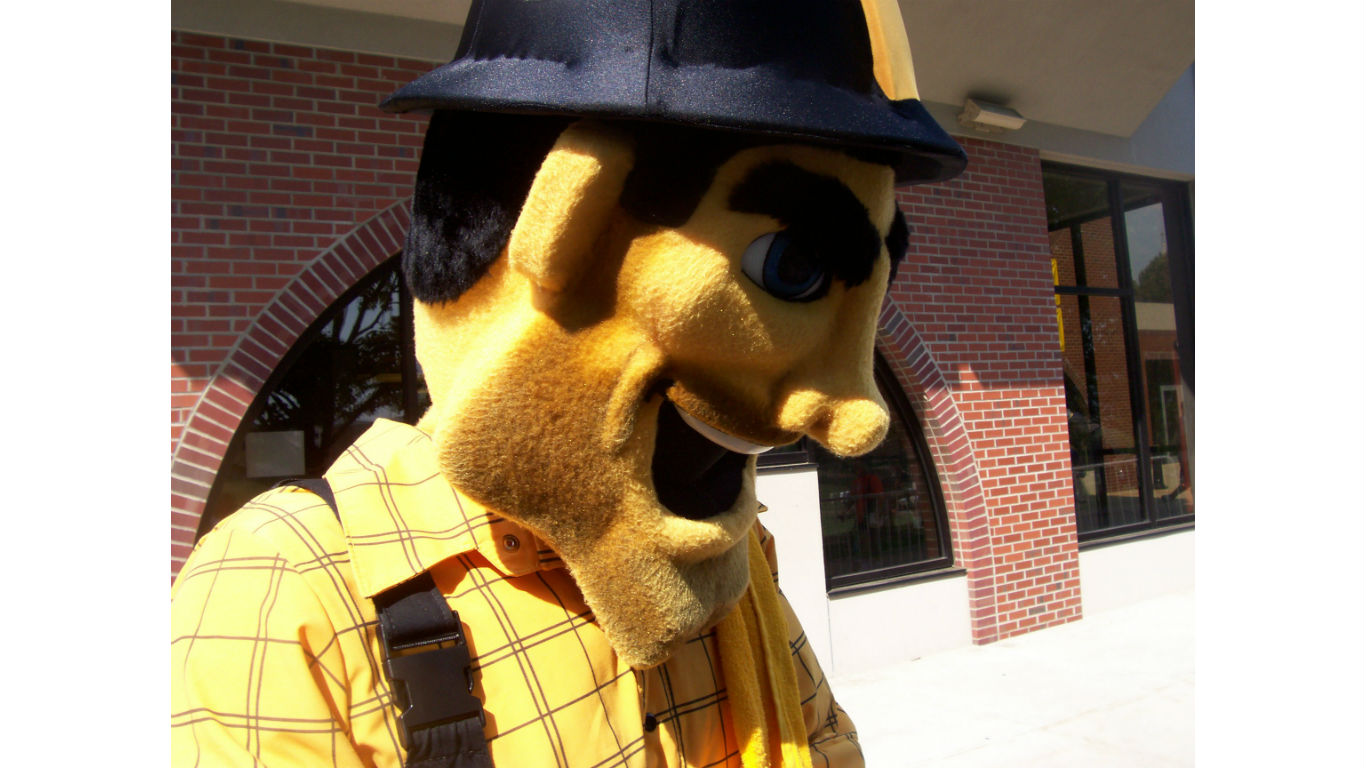
27. Pittsburgh Steelers
>Mascot: Steely McBeam
>When mascot was debuted: 2007
The Steelers joined the NFL the same year as the Eagles, and like their fellow Pennsylvania team, they did not adopt a mascot until many years later. The character Steely McBeam, a nod to the city’s steelmaking past, debuted in 2007. Steely McBeam was the winning entry of more than 70,000 that were submitted for the “name-the-mascot” contest.
28. San Francisco 49ers
>Mascot: Sourdough Sam
>When mascot was debuted: 1994
Sourdough Sam is a caricature of a 49er, a prospector who went to California hoping to strike it rich in the 1849 California Gold Rush. The San Francisco 49ers adopted the mascot in 1994, nearly 50 years after they joined the All-America Football Conference.
29. Seattle Seahawks
>Mascot: Blitz
>When mascot was debuted: 1998
The mascot Blitz is a large, blue bird that debuted on Sept. 13, 1998, at the Seahawks’ home opener at the Kingdome in Seattle. Blitz has been joined by feathered sidekicks Boom and Taima — the latter is a real hawk. The Seahawks name was the result of a fan contest that drew 20,365 entries who suggested 1,742 names.
[in-text-ad-2]
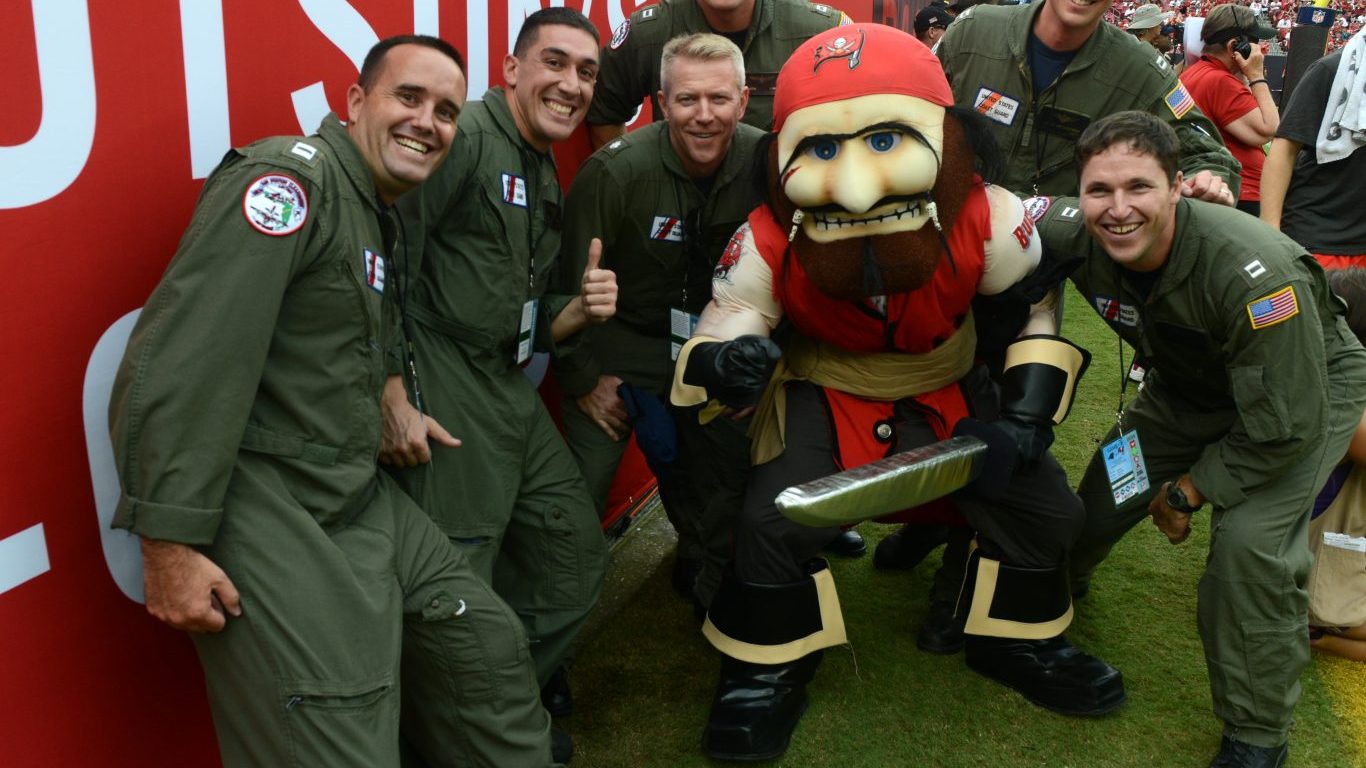
30. Tampa Bay Buccaneers
>Mascot: Captain Fear
>When mascot was debuted: 2000
Captain Fear is a caricature of a pirate, in acknowledgment of the buccaneers who marauded ships in Florida’s waters in the 17th century. The blue-eyed, black-haired privateer replaced a parrot mascot named Skully in 2000.

31. Tennessee Titans
>Mascot: T-Rac
>When mascot was debuted: 1999
T-Rac is a caricature of a raccoon, the state animal of Tennessee. The mascot debuted in 1999, four years after the team relocated from Houston and changed its name to the Titans from the Oilers.
[in-text-ad]
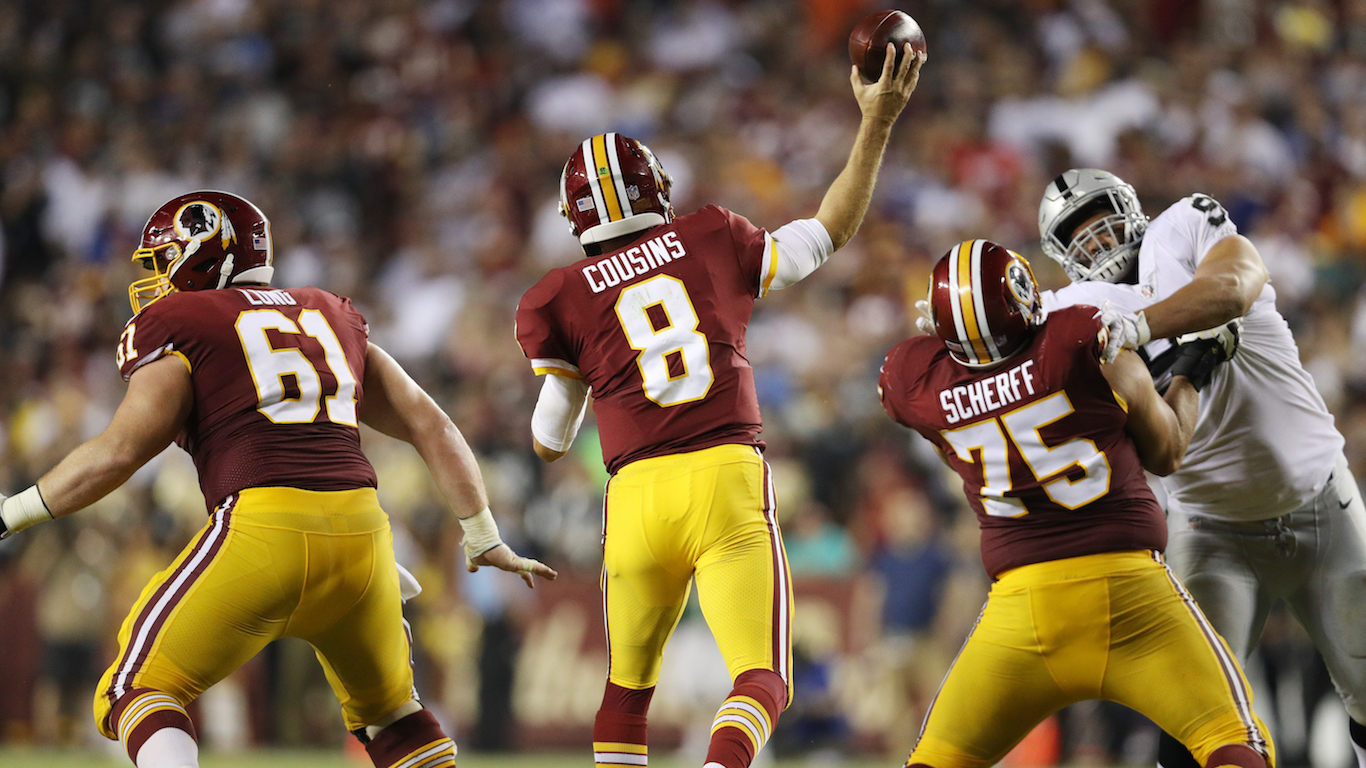
32. Washington Redskins
>Mascot: N/A
>When mascot was debuted: N/A
The Washington Redskins are one of four NFL teams that do not have a mascot. Until his death in 2016, an African-American man named Zema Williams (aka Chief Zee) was the unofficial mascot of the Redskins, dressing up in Native American costume, with a war bonnet and rubber tomahawk. The Redskins have been under pressure to change their name from those who find it offensive and demeaning to Native Americans.
Credit card companies are handing out rewards and benefits to win the best customers. A good cash back card can be worth thousands of dollars a year in free money, not to mention other perks like travel, insurance, and access to fancy lounges. See our top picks for the best credit cards today. You won’t want to miss some of these offers.
Flywheel Publishing has partnered with CardRatings for our coverage of credit card products. Flywheel Publishing and CardRatings may receive a commission from card issuers.
Thank you for reading! Have some feedback for us?
Contact the 24/7 Wall St. editorial team.
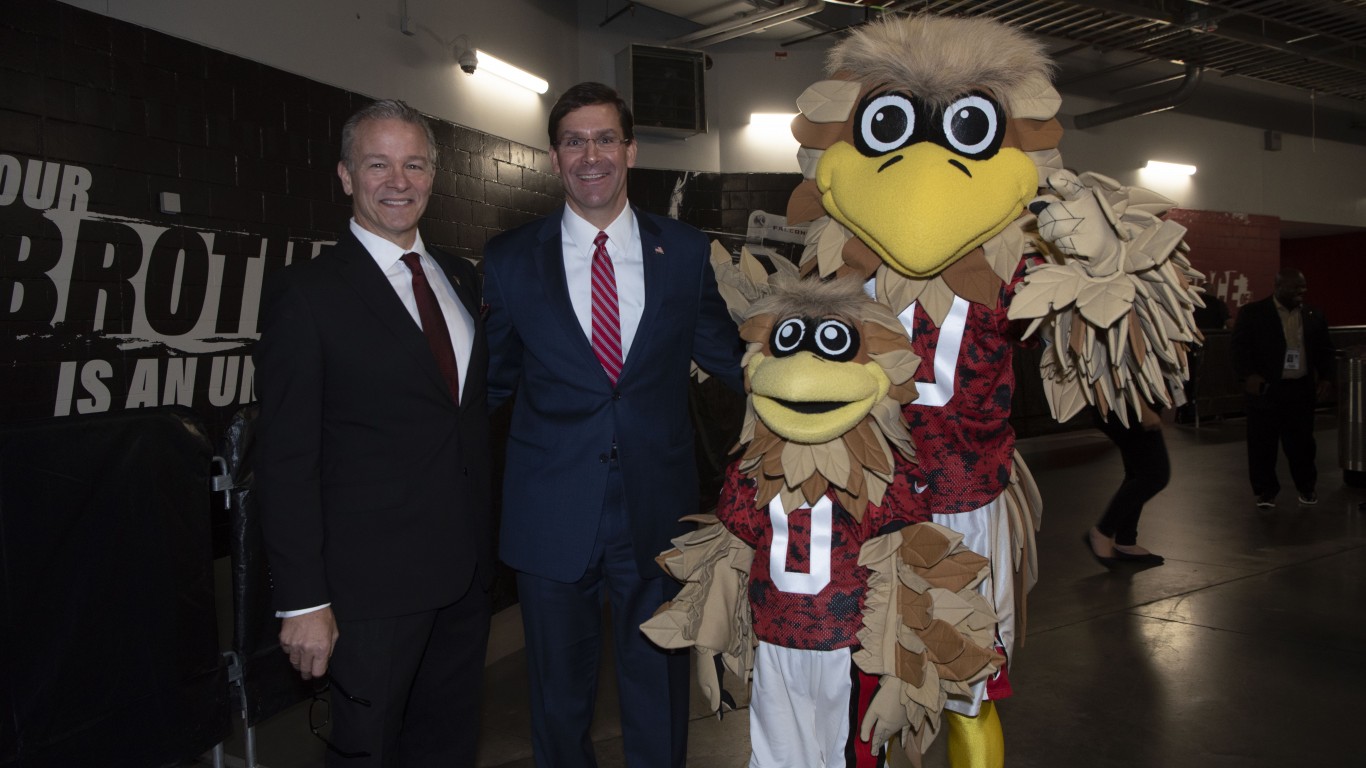
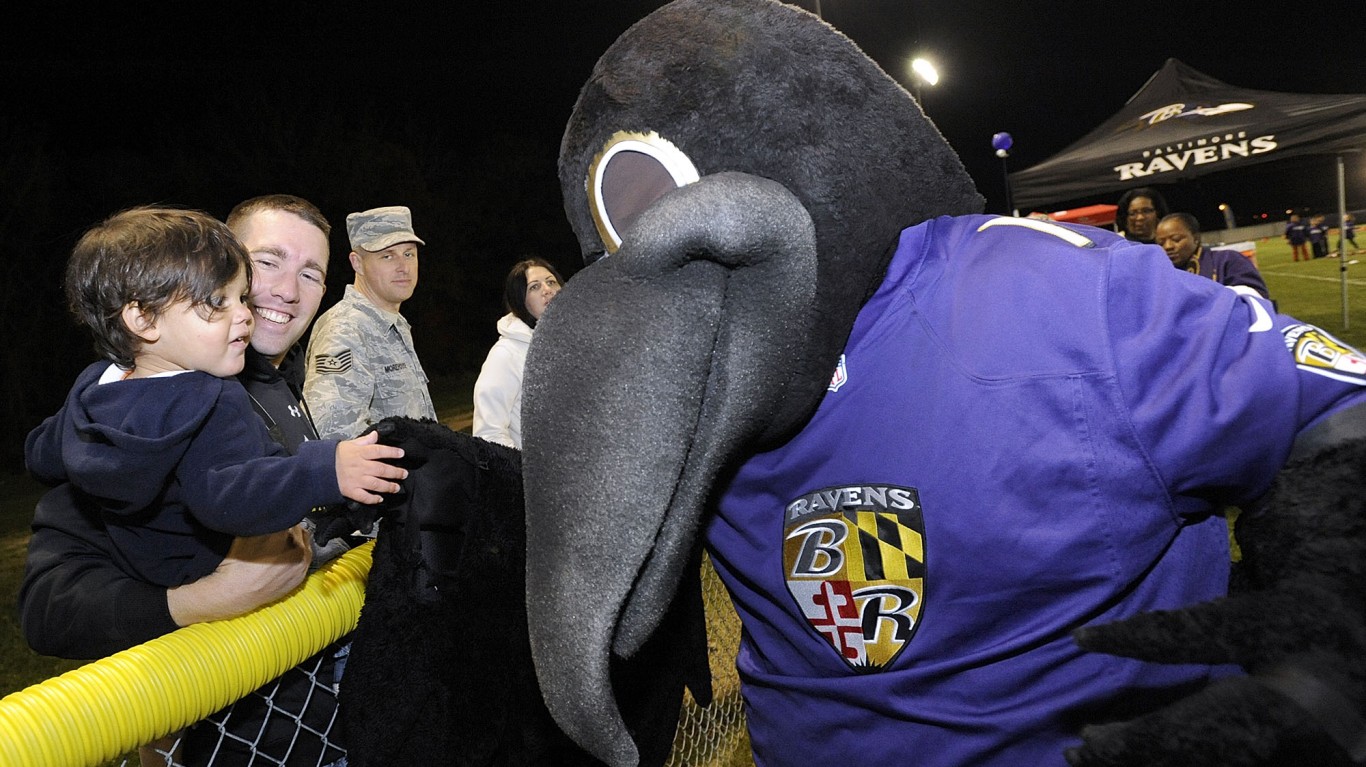
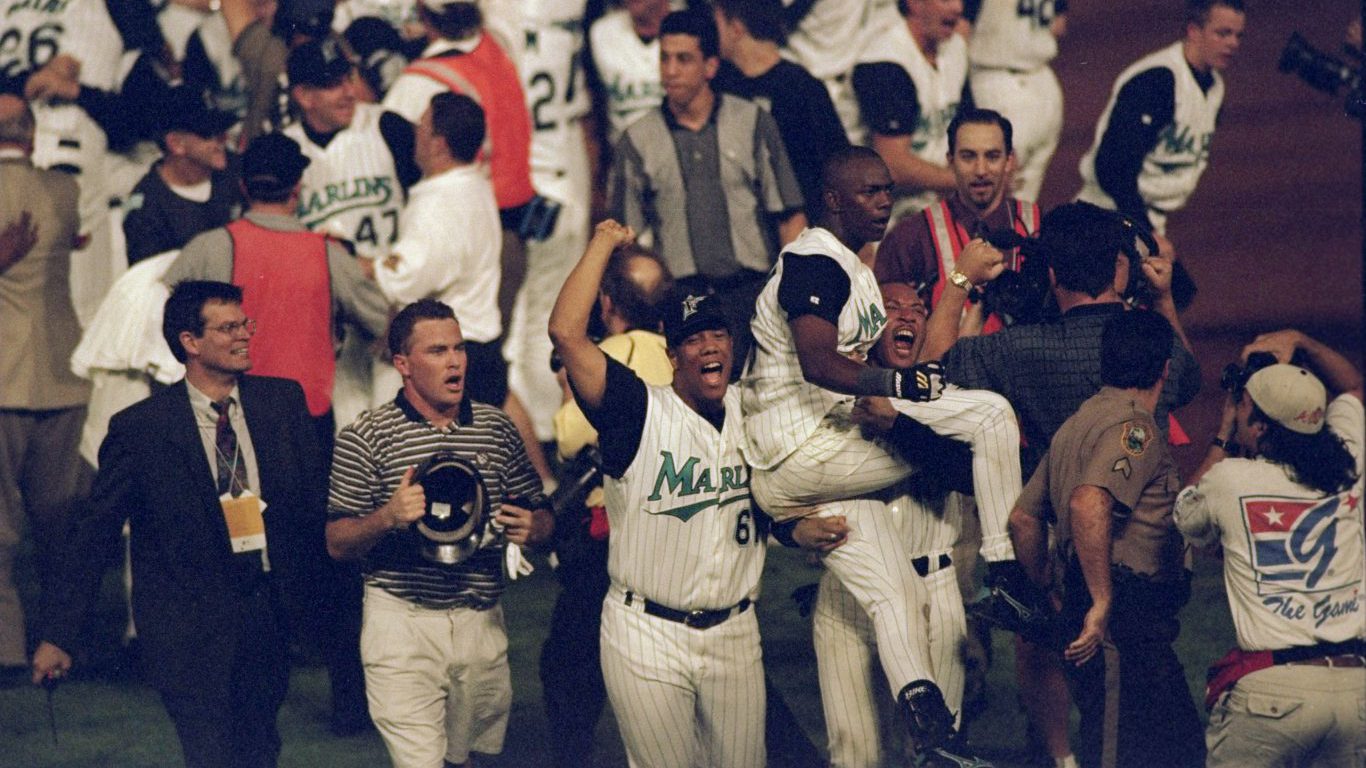 24/7 Wall St.
24/7 Wall St.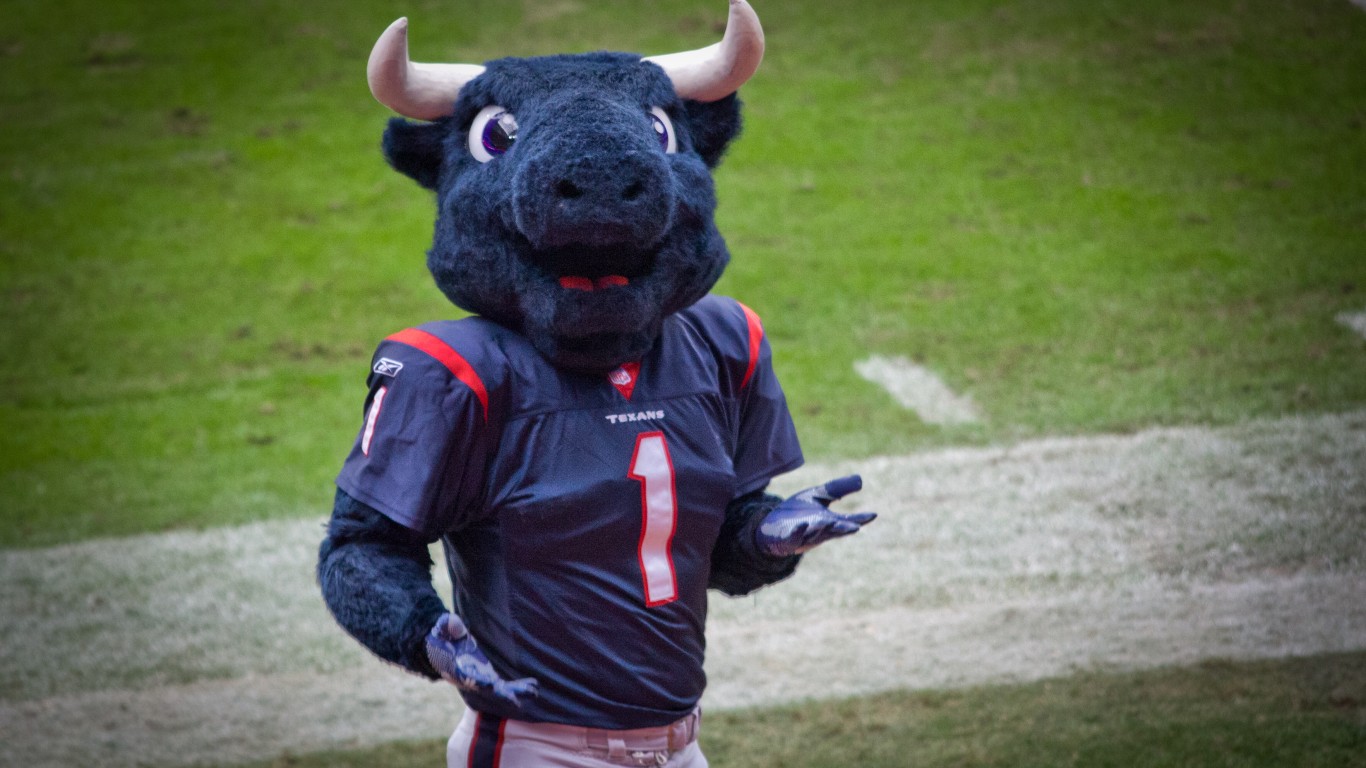
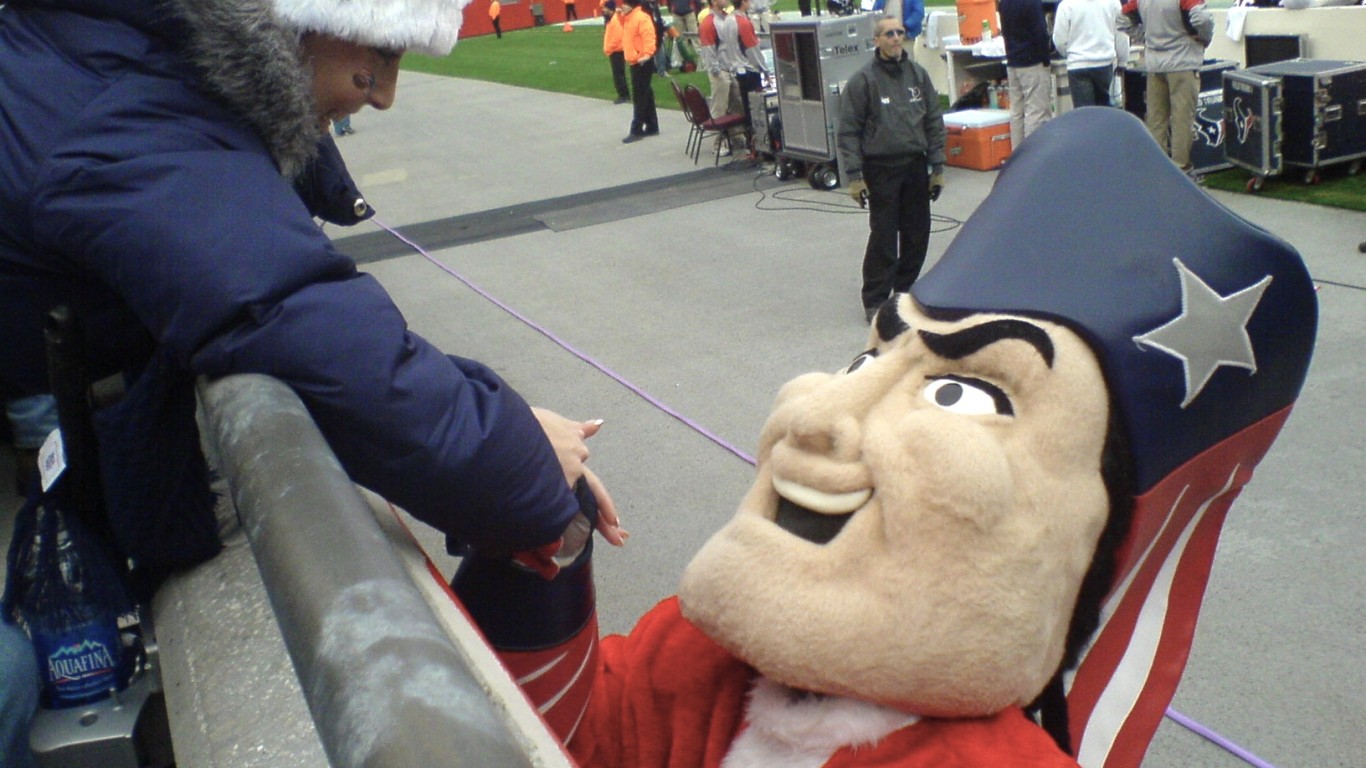
 24/7 Wall St.
24/7 Wall St.